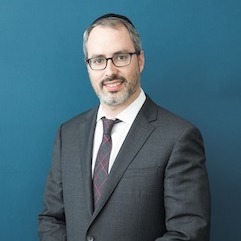We know there is a special commandment, as part of the mitzvah of Talmud Torah, to learn on the road. This is referred to as the mitzvah of U’velechta B’derech, learning ‘on the way’. However, upon closer examination, it is necessary to discuss exactly what type of learning is appropriate when one is journeying.
In Parshas Vayigash Yosef instructs his brother’s אל תרגזו בדרך “do not become agitated on the way”. What did he mean by this command? Rashi explains that the simple meaning is that Yosef understood that there could very possibly be an argument amongst the brothers as to who had been responsible for his sale, which in retrospect had been the wrong thing to do. He therefore cautioned them not to become agitated along the way.
However the Gemara (Taanis 10b), also quoted by Rashi, understands a deeper pshat. Do not get involved in a dvar Halacha and thereby become agitated by the road. Simply understood this means that they will get lost because of their involvement in the Torah discussion, (and this is how Rashi on the Gemara understands as well). So then it would seem that one should not learn on the road?
The Gemara immediately questions this from the incident of Eliyahu Hanavi, who was taking his last walk with Elisha, when a fiery chariot bore down on them and separated them, and then ultimately carried Eliyahu to the Heavens. The verse states that they were walking and speaking (words of Torah). The Gemara deduces that if they would not have been speaking words of Torah they would have been scorched by the fire.
The Gemara resolves the contradiction -one is obligated to learn on the road, but one may not, as Yosef told his brothers, become ‘agitated’ that is delve deeply into a topic.
Tosfos quotes a Midrash which sees a seemingly contradictory message in the verse – make sure not to interrupt your Torah learning while you are on the road. Being that the voyage can be distracting Yosef was cautioning his brothers to make sure to keep up their learning.
The Kli Yakar explains that there is no contradiction. The Midrash is referring to the permissible, non in depth type of learning, which the Gemara also advocates, and this is referred to as Divrei Torah. Indeed the precise wording of the Midrash do not stop your Divrei Torah. What Yosef was cautioning against, in the words of the Gemara, was ‘Dvar Halacha’ which refers to in depth, multi layered intense learning, which was not recommended for travelers.
This approach beautifully resolves the apparent contradiction between the Gemara and the Midrash, and is explicit in the nuances of the Gemara. The Gemara hadn’t known this differentiation in its question and therefore asked on Yosef from that which was said that two scholars must talk in Divrei Torah. To that the Gemara responds with the differentiation – Yosef cautioned against Dvar Halacha, but two scholars who are on the road must engage in Divrei Torah or worthy of being burnt!
This approach would be somewhat difficult to say in Tosfos, because the language of Tosfos is ‘do not interrupt you Dvar Halacha.’
The Meforshim question: why was this advised by Yosef, but not by Yaakov on their initial trips? The Emek Halacha (R Menachem Mendel of Levov) quoted by the Midrash Halacha, suggests that Yaakov had no need to caution them, for they would hurry regardless out of their obligation to fulfill their fathers command, and the mitzvah of Kibud Av would restrict them from tarrying. However, now that they had discovered that learning Torah trumps Kibud Av, because Yaakov was punished for the twenty two years he was away from Yitzchak in the house of Lava by being estranged from Yosef for twenty two years, but he was not punished for the fourteen years he spent in the Yeshiva of Shem and Ever. This was only realized when they saw that Yosef’s separation from Yaakov coincided with Yaakov’s separation from Yitzchak. Therefore now they were susceptible to learn at the expense of hurrying home in fulfillment of Kibud Av, and Yosef had to caution them ‘Al Tirgazu Bderech’.
The Kli Yakar has a slightly different understanding of Yosef’s words of caution in the Gemara. In his understanding, Yosef wasn’t concerned for the time or travel plans of his brothers, rather his concern was for the Torah which would suffer as a result of being written on the go. This can perhaps be illustrated by the Rambam who writes as a disclaimer at the end of his commentary on Mishnah “I was working on this Commentary under the most arduous conditions… as we were driven from place to place… while traveling by land or crossing the stormy sea,”.


Thank you for writing. We missed you!
don’t forget to update your profile.
I would agree that the Gemora is explaining Yosef’s cautionary words and not disagreeing with the basic pshat. Yosef was warning them against getting agitated of the “dvar halacha” of whom was to bear the guilt of the sale.